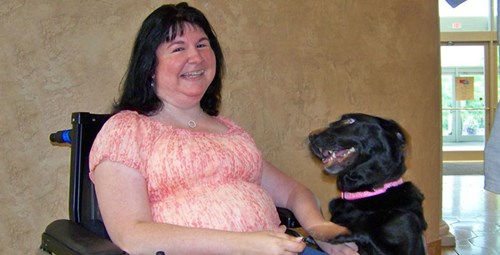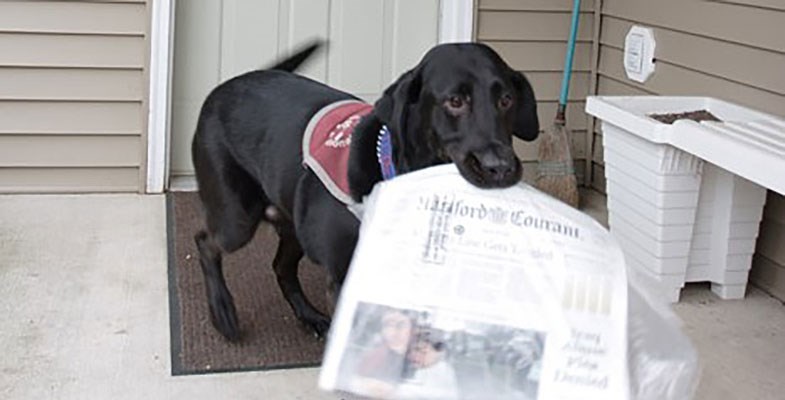By Guest Blogger Therese Nadeau
Service dogs can do amazing things. They can remind someone to take their medication. They can detect imminent seizures and help with recovery. They can open doors, fetch a phone, and act as a person’s eyes and ears.
But they aren’t pets. Just like bomb-sniffing dogs or other “professionals,” service dogs have a job to do. When you see them in action, it’s tempting to picture life with a best-friend-plus-household helper. But life with a service dog comes with some adjustments.
Here are some things to consider before taking on a four-legged partner.
Understand the reasons you want a service dog and how it will affect your life
To be successful with a service dog, it helps to have clear goals. It helps even more to have realistic expectations regarding the whole sweep of doggy behavior, from barking at strangers to being distracted by passing squirrels. It’s the owner’s responsibility to help the dog be a service dog no matter what the situation.
If you’re still thinking you want a service dog . . . congratulations: you just signed yourself up as a dog trainer and ambassador for service animals. In other words, be prepared for a service dog to change the way you live.

Training takes commitment – and time
The typical training period takes anywhere from six months to two years – or more. My dogs could respond to over 80 commands, but the process to get there took years.
Most people get their dogs from schools or trainers who start the training process. Some schools hold two- to three-week “boot camps” where you train intensively with a number of dogs. At the program’s end you select your dog. Other people prefer to find their own dog and send it to be trained. I chose a local service dog organization, and trained with a private trainer. The choice is very personal.
No matter where the process starts, the owner has to be involved in the training or the dog will become a pet. For instance, feeding table scraps to the dog will likely encourage the dog to beg. Doing that at a restaurant can get the both of you kicked out. To succeed, the owner needs as much training as the dog. In addition, when you are newly training a service dog, it is important that you are the only person to show attention, give commands and exchange lots of love to build a bond with each other.
Be ready for the attention
People love dogs. And most people are very curious about service dogs. Going out in public with a service dog attracts attention and a LOT of questions. When I go shopping, I have to add 10-15 minutes in the store for people to stop me and ask questions.
Service dog teams also need to help others understand service dog etiquette, from not petting or feeding the dog to asking first before trying to help. People partnered with a service dog also should be ready to explain their own preferences for interacting with the dog.
I happen to like teaching people and will answer the same questions where ever I go. If you’re outgoing, a service dog is also a great conversation starter. But if that sounds really annoying to you, or if you don’t like the attention, you might want to think twice about a service dog.
Be ready to advocate for access
Many people who serve the public may not know the Americans with Disabilities Act (ADA) rules about allowing a service dog on premises. Businesses and organizations have to make accommodations for service dogs. This includes restaurants, hotels and hospital patient rooms. Hotels can’t charge extra for accommodating a service animal or relegate guests with service animals to “pet friendly” rooms.
But even though the law is on your side, as a service dog owner you have to be ready to advocate for yourself and the dog. I’ve learned that if someone refuses to let me in with the dog, I may have to argue the case.
One time at a restaurant with friends, the waitress told me, “The dog is not allowed in here because there’s food.” She didn’t care that it was a service dog. Often, when people learn about the ADA law allowing service dogs, they’re OK with it. This time, the waitress was not going to change her mind. We wound up eating somewhere else. However, I did follow up with the parent company and they did take action. The point is to not just let it drop, or things will never get better.
You need to be an animal lover, or it probably won’t work
This may sound obvious, but if you’re not comfortable around dogs, chances are you also won’t be comfortable with a service dog. Because even though they’re trained, a dog is a dog and they’re going to still do those things dogs do.
What I learned from my dogs
My dogs taught me that you have to do what you’ve got to do and not be afraid of anything. No matter what the situation, we found our way together.
This was an important lesson because it’s a fact of life that dogs don’t live as long as humans. At some point, we have to say good-bye. We may end up caring for their needs more than they are caring for ours. It may seem strange to say, but that can also be a blessing. Having to take care of them kept me distracted from my own issues. We knew we were helping each other.
While saying goodbye to my service dogs was more difficult than words can say, I would do it over and over again. They have made a huge difference in my life both physically and emotionally. They taught me determination, perseverance, to stop and enjoy life, and unconditional LOVE.
Final word
Having a service dog by your side is definitely not for everyone, but for those of you that decide it is and you are ready for this endeavor . . . Go for it!!! It’s worth the hard work and patience. Your life will FOREVER be changed.
Add to Favorites
